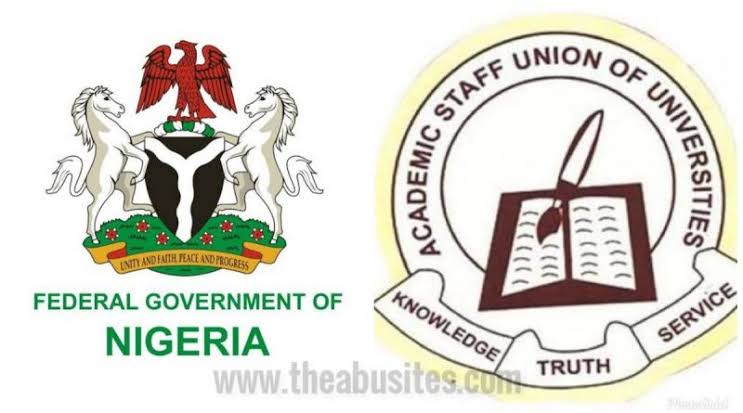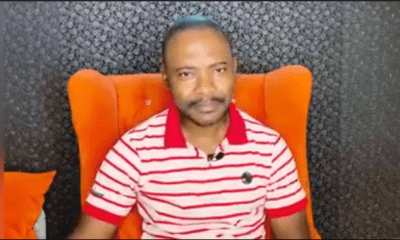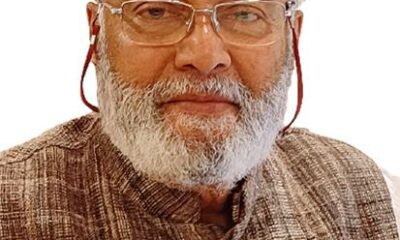National Issues
Putting An End To The Perennial ASUU/FGN Quagmire -By Arinbomen Star
It’s high time Nigerians rose up to the occasion and demanded a permanent resolution of the perennial standoff between the ASUU and the FGN at the expense of Nigerian youths. The ASUU and the FGN are not the only stakeholders in the Nigerian public university system. Thus, no longer should they be allowed to use the futures of Nigerian youths as bargaining chips.

Albert Einstein in one of his timeless witticisms opined, “Insanity is doing the same thing over and over and over again and expecting different results”. The recurrent standoff between the Federal Government of Nigeria (FGN) and the Academic Staff Union of Universities (ASUU) dates back to the military regime in the 1980s. While the scope of the ASUU’s demands has expanded over the years, the thrust of their agitation has remained the same- welfare of the public university teachers and autonomy of the system where they operate.
Since the return of Nigeria to democracy in 1999 to date, the ASUU has embarked on 18 strikes to press home their demands. Despite repeatedly disrupting academic activities in Nigerian public universities for over 23 years in a bid to actualize their demands, the bone of contention has remained unresolved. After each long-drawn-out standoff, the FGN reaches a hollow truce with the ASUU, and the latter suspends its strike. In reality, however, the bone of contention hangs in the air like a sword of Damocles, ready to be reactivated at the caprice of the ASUU.
The recurrent FGN/ASUU impasse is akin to the game of chess in which each side manipulates the pawns to its advantage. The FGN (strict politicians) and the ASUU (academic-politicians) have been using Nigerian youths as pawns in their power tussle. The FGN is committed to taming the ASUU and making them accountable. The ASUU, on the other hand, are bent on having autonomy. They want the Nigerian public university system transformed into a microcosm, where they can exert their influence and better their lots; just like their strict politician counterparts in the macrocosm.
Without mincing words, both the FGN and the ASUU are culpable for the checkered history of the Nigerian public university system, as well as the vagaries that hang over its future. Needless to say, the FGN’s poor financial commitment to the public universities has negatively impacted the scope and the quality of education that they avail their students; however, the repeated crippling of academic activities in the institutions by the ASUU has made the situation worse.
The recurrent standoff between the FGN and the ASUU has always been a win-win venture for both gladiators; while the stakeholders that really matter, the students, are left to grapple with the aftermath of the indiscretion and lack of originality of the supposed superintending stakeholders. The two antagonists pull their respective weight on each side of the balance, with the futures of millions of aspiring Nigerian youths hanging precariously on the ensuing precipice. While each tussle lasts, the FGN representatives continue to relish the trappings of their exalted offices; the ASUU, on the other hand, have their accrued salaries and allowances paid after agreeing to a hollow truce.
At the end of each strike, however protracted it is, the students are expected to be grateful for the truce, pick up themselves and continue from where they got stagnated by the actions of the superintendents of the system. It is mindboggling that nobody has ever thought about the psychological impact of the recurrent closure of Nigerian public universities on the students; this is not to mention the social impact on the nation, and the economic impact on owners of small-medium enterprises that thrive only when the public universities are up and running. It is noteworthy that while the ASUU and the FGN officials can afford to send their children and wards to private universities both within and without the country, such opportunities are beyond the means of most Nigerian families.
It’s high time Nigerians rose up to the occasion and demanded a permanent resolution of the perennial standoff between the ASUU and the FGN at the expense of Nigerian youths. The ASUU and the FGN are not the only stakeholders in the Nigerian public university system. Thus, no longer should they be allowed to use the futures of Nigerian youths as bargaining chips.
When the path ahead becomes a cul-de-sac, the rational course of action should be forging a new path, not running the head against the wall. If the futures of Nigerian youths matter to us, then a drastic measure has to be taken to overhaul and stabilize Nigerian public universities. There is the urgent need by Nigerians to demand absolute depoliticization of the nation’s public university system. It will be foolhardy to maintain the status quo, and hope that someday things will just align themselves aright in the system. If for over three decades the recourse to the same action has not yielded the desired results, I think it will be rational at this crucial juncture to explore new options. Recall Albert Einstein’s definition of insanity.
Undoubtedly, a workable solution to this knotty situation in our public universities is likely going to be a contentious one. It is a proposal that will be greeted with repugnance by many. Nonetheless, a premium should be placed on putting paid to this termless morass between the ASUU and the FGN at the expense of the futures of millions of aspiring Nigerian youths.
Expanding the frontiers of the stakeholders in Nigerian public university system through restructuring of the extant configuration is sine qua non for the much needed revamp in the system. This will entail incorporating private partnership into the public university system. This synergy will ensure thorough oversight function and accountability. It will also grant equity and fairness to all stakeholders. It has been proven time and again in Nigeria that public institutions fare better either when privatized outright, or when a private-public synergy is created.
While the foregoing proposition will be starkly rebuffed by the ASUU and the FGN, it might also not be embraced by most Nigerian students and their parents or guardians. To the ASUU, implementing this proposition will sound the death knell of their struggle and tame their growing influence. In the same vein, the FGN will fight this proposition because it will bring to an end an era of personal aggrandizement at the expense of the public university system. On the part of the students and their sponsors, a new era of greater financial commitment to university education will be ushered in by the implementation this proposition. Well, viewed from an objective standpoint, the alternative to this proposition, maintaining the status quo, bears a steeper price, albeit a surreptitious one. Time is money. The cumulative cost implication of the time wasted due to the vagaries that have become etched into the fabric of Nigerian public universities is a much steeper price to pay, compared to the extra commitments that might attend an era of public-private partnership in the system.
However, in order to cushion the effect of this proposed restructuring of the public university system on students and their sponsors, robust and sustainable financial supports for the underprivileged students should be incorporated into this proposed configuration. To this end, it is imperative that besides ample scholarship schemes, zero-interest loans be made available to students who require them. Such loans should be repayable in installments upon securing jobs after graduation by the affected students. Given the foregoing premise, it is imperative that the Central Bank of Nigeria (CBN) and the National Identity Management Commission (NIMC) are vital stakeholders in this proposition.
Nigerian public universities can be overhauled, if the right steps are taken in the right direction. Such right steps should be premised upon the appreciation of the students as vital stakeholders in the education sector of the nation. Thus, every right step that is geared towards revamping Nigerian public university system must place a premium on the students, who represent the future of our dream Nigeria.
According to America’s 35th president, John F. Kennedy, “Our progress as a nation can be no swifter than our progress in education. The human mind is our fundamental resource”. The potentialities for building a virile, prosperous and dynamic nation repose in the youths; therefore, it is imperative to groom their minds through the instrumentality of sound, all-round and uninterrupted education. This will afford the youths the right platforms to harness their inherent potentials.
If the status quo in Nigerian public university system is maintained; then, the future of the nation is precarious. Now, therefore, is the opportune time for us as a people to awaken the patriotic spirit in us, and throw our weight behind the crusade that will emancipate Nigerian public university system from the tangle of selfish and unpatriotic superintendents of the system.
Arinbomen Star,
Ibadan.
(starins4real@yahoo.com)










